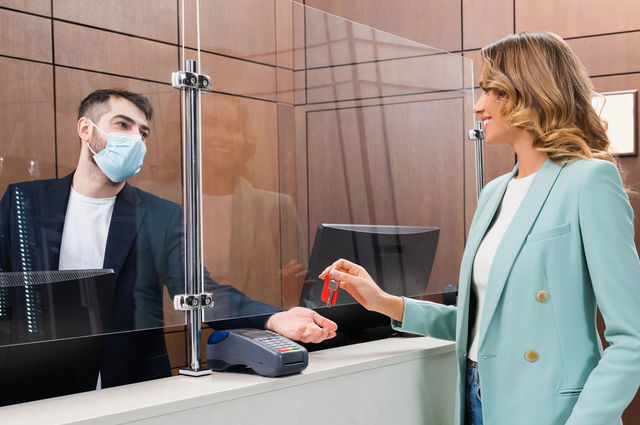Post-COVID Guest Experience: How Can Hotels Maintain a Personal Touch?
4 experts shared their view
The social distancing measures implemented during the height of COVID-19 will linger and impact hospitality well into the future. This panel-viewpoint aims to address how hospitality leaders can think outside the box in the post-COVID era.... by asking "How can hoteliers
continue to deliver a personalized experience with a human touch... while ensuring a contactless, sterile environment?"
The answer: Not easily! The old 'close to the customer' approach is going to have to undertake a socially distanced approach. Guest service folks will require re-education. Hand shakes? Probably not. Removing masks? Never. The new normal of greeting will involve personalized messages, welcome gifts, and a lot of technology to reassure guest of both care and commitment to their welfare.
Let's take a step back for a moment to look at the bigger picture: COVID-19 will absolutely linger for some time with new variants and local or regional hotspots of concern. We'll likely face rolling vaccinations and other steps as well. That said, the demand for travel is already popping. So this new world is going to be a constant challenge, not just because of a demand for contactless service options, but also because the demand for streamlined technology is rising with it. Yet there's no one-size-fits-all solution to striking the perfect balance between high-touch service and touchless. Every guest is different—different needs, different comfort levels, and different preferences. We've already seen this with restaurants. QR codes dominate menu look-ups, but people are choosing whether to go for all digital or to intermix with a human element. The best way to find balance is to put your guests firmly in control.
All you have to do is make them aware that they have a choice: you can use technology to personalise the guest experience from a distance, using a custom check-in flow or leveraging tools like SMS messaging and in-app notifications to connect with guests before, during, and after their stay. In return, they can stop by the front desk or simply message you back—finding their own perfect balance between in-person and contactless service.
At the end of the day, personalised experiences are all about "thoughtful" gestures. The great thing is that these gestures can be executed in ways that don't involve contact. This can include outreach emails, following up once the guest is at the property, texting services, hand-written welcome notes, and committing to always finding ways to delight and surprise guests. Stuck on what to do? Do a little research on a guest prior to their arrival (so much is shared on social media) and tailor amenities or suggestions for you based off of the interests they share online. There are so many ways to get creative. We are living in an ever-increasing technological world, so this is not only imperative for the here and now, but for the future.
My perspective is that an authentic, personalised experience does not require touching the guest. It is true that we are accustomed to shaking hands, speaking in close proximity, and serving the guest items that one touches, but contact and proximity are not what guests remember when they complement the service of a hotel. What they recall was the sincere caring by the service leaders and associates. Leaders need to be able to be empathetic to the guest needs and really work hard on creating a more personalised experience? Service leaders can ensure that the brand promise of the hotel is clearly demonstrated and established not only through contactless service in the hotel right now, but also during the pre-arrival period from initial booking through to arrival, as well as regular follow up after their stay. Many guests may have a short memory of the full, authentic, and memorable experience that hoteliers have provided pre-COVID. Now hotel leaders simply need to think about different ways of channeling their substantial service mindset to other ways of interacting. For example, when greeting a guest, the leader might politely bow in front of the guest (as is done in Japan and become popular now) to welcome them, or give an earnest fond farewell from a reasonable distance instead of a handshake. You will also need to be mindful of guests that want extra social distancing and ask not to have their room serviced during their stay. In addition to all of the new sanitation standards we deploy in our hotels, details like having less letter paper in the room, and more digital options go a long way to ensuring both the perception and reality of a sterile environment. By having captured all the touch points prior to a guest's arrival, you are creating a more intimate and authentic guest experience and hopefully your guests will recognise this and enjoy their stay with you.




